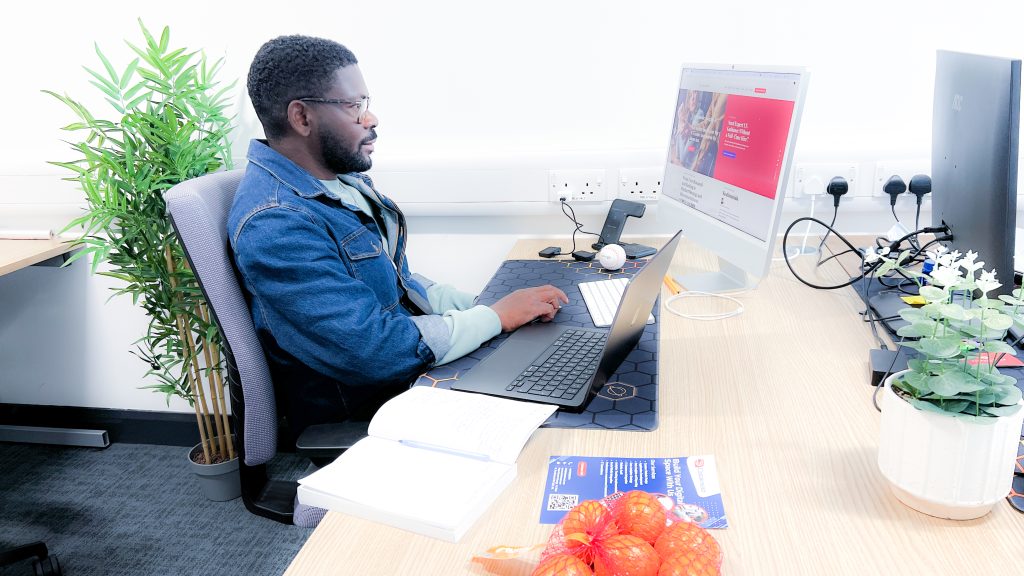
Manufacturers face a myriad of challenges that can impact efficiency, employee satisfaction, customer relationships, and ultimately, profitability. As manufacturing businesses evolve, there is a growing recognition that traditional solutions may no longer suffice. To thrive in this competitive environment, companies must embrace a more integrated, user-centered approach to problem-solving.
This is where holistic User Experience (UX) consulting comes into play. By addressing the needs of all stakeholders—employees, customers, partners, and the business itself—holistic UX consulting offers a comprehensive strategy that can revolutionise your manufacturing business.
Manufacturing companies, regardless of their size or specialisation, face common challenges that hinder productivity, innovation, and growth. These challenges include:
1. Complexity in Processes and Systems: Manufacturing processes often involve intricate workflows, multiple software systems, and various machinery, each with its own interface and user requirements. This complexity can lead to inefficiencies, errors, and a steep learning curve for employees.
2. Siloed Operations: Departments within manufacturing firms often operate in silos, leading to communication breakdowns, delayed decision-making, and misaligned objectives. This fragmentation can result in lost opportunities for optimisation and innovation.
3. Employee Training and Retention: High turnover rates and the need for continuous training are ongoing challenges in manufacturing. When employees struggle with poorly designed systems or cumbersome processes, it impacts job satisfaction and increases the likelihood of errors.
4. Customer Expectations and Customisation: Modern customers demand high-quality, customisable products delivered quickly. Manufacturing companies need to be agile and responsive to these demands, requiring systems that are flexible and easy to use.
5. Integration of Emerging Technologies: As manufacturing adopts advanced technologies like IoT, AI, and automation, companies must ensure that these new tools are seamlessly integrated into existing systems. This requires careful consideration of the user experience to avoid disruptions.
6. Sustainability and Compliance: Environmental regulations and sustainability goals add another layer of complexity. Manufacturers must ensure that their processes are not only efficient but also environmentally responsible, which can be a challenging balance to strike.
Given these challenges, it’s clear that traditional approaches—focusing narrowly on efficiency, cost reduction, or technical capabilities—are insufficient. Instead, a more holistic approach that considers the user experience across the entire manufacturing ecosystem is necessary.
Holistic UX consulting is a comprehensive approach to designing and improving systems, processes, and products by considering the needs and experiences of all users. In the context of manufacturing, this means not just focusing on end-users or customers but also considering the experiences of employees, suppliers, partners, and other stakeholders.
A holistic UX consultant takes into account the entire ecosystem, identifying pain points, understanding workflows, and creating solutions that enhance usability, reduce complexity, and foster collaboration. This approach goes beyond just the design of interfaces; it looks at how systems interact, how information flows, and how different parts of the business can be better aligned.
Holistic UX consulting can transform your manufacturing business by addressing the specific challenges that hinder growth and efficiency. Here’s how:
One of the most significant benefits of holistic UX consulting is its ability to simplify complex processes and systems. By conducting in-depth research and user testing, UX consultants can identify bottlenecks and pain points in your manufacturing processes. They can then redesign workflows and interfaces to be more intuitive and efficient.
For example, a holistic UX approach might involve redesigning the interface of a manufacturing execution system (MES) to reduce the number of steps required to complete a task, making it easier for employees to use and reducing the likelihood of errors. This can lead to faster production times and lower costs.
Holistic UX consulting encourages collaboration across departments by focusing on the needs of the entire organisation. UX consultants can work with different teams to understand their goals and challenges, then design systems and processes that facilitate better communication and cooperation.
For instance, a UX consultant might design a centralised dashboard that provides real-time data to all relevant departments, allowing them to make informed decisions quickly and reducing the lag caused by siloed operations. This not only improves efficiency but also fosters a culture of collaboration and innovation.
Employee satisfaction is closely tied to their experience with the tools and systems they use daily. Holistic UX consulting can help design more user-friendly interfaces and processes, reducing the time and effort required for training. This not only makes employees more effective but also enhances their job satisfaction, leading to lower turnover rates.
A practical example would be designing an intuitive, easy-to-navigate training module that uses visual aids and interactive elements. This can make it easier for new hires to get up to speed and for existing employees to learn new processes or systems.
Customers today expect products that are high-quality, customisable, and delivered quickly. Holistic UX consulting can help manufacturing companies develop systems that allow for greater flexibility and responsiveness. By designing user-friendly interfaces for customer-facing platforms, manufacturers can offer a seamless experience from order placement to delivery.
For example, a UX consultant might design an online portal that allows customers to easily customise their orders, track production progress in real-time, and receive updates on delivery. This enhances the customer experience, leading to higher satisfaction and repeat business.
As new technologies are introduced into manufacturing, it’s crucial that they are integrated in a way that enhances rather than disrupts existing processes. Holistic UX consulting ensures that these technologies are user-friendly and that they work well with other systems.
A UX consultant might, for example, work on the integration of IoT sensors into a production line, ensuring that the data collected is presented in a clear and actionable way to operators. This not only improves efficiency but also helps prevent errors and downtime.
Sustainability is becoming increasingly important in manufacturing, with companies facing pressure to reduce their environmental footprint. Holistic UX consulting can help design processes and systems that support sustainability goals while ensuring compliance with regulations.
For instance, a UX consultant might develop a system that tracks energy consumption and waste production in real-time, providing actionable insights that help reduce waste and improve efficiency. This not only helps the environment but also reduces costs and ensures compliance with regulations.
In an industry as multifaceted and dynamic as manufacturing, the traditional one-sise-fits-all approach is insufficient for addressing the diverse and evolving challenges that businesses face. Manufacturing companies operate in a complex ecosystem where the needs of employees, customers, partners, and the business must all be considered to achieve sustainable success. A strategy that takes into account this broad spectrum of stakeholders is not just advantageous—it is critical. This is where holistic UX consulting comes into play, offering tailored solutions that address the unique issues and opportunities within the manufacturing sector.
Holistic UX consulting goes beyond mere process optimisation; it encompasses a comprehensive understanding of the user experience across all touchpoints within the organisation. This approach allows manufacturers to simplify intricate processes, enhance employee engagement and satisfaction, meet and exceed customer expectations, and seamlessly integrate emerging technologies. By focusing on the entire user experience, manufacturers can create environments that are not only more efficient but also more innovative, responsive, and adaptive to market changes.
Moreover, in today’s rapidly evolving technological landscape, where user experience is a significant differentiator, adopting a holistic UX strategy is no longer optional—it is essential. Companies that fail to prioritise UX risk falling behind competitors who are more agile in responding to user needs and market demands. Investing in holistic UX consulting equips manufacturing businesses with the tools and insights necessary to streamline operations, foster a culture of innovation, and, ultimately, drive growth.
In conclusion, holistic UX consulting represents a strategic imperative for manufacturing companies aiming to remain competitive in a fast-paced and ever-changing market. By embracing this approach, manufacturers can not only address current challenges but also position themselves to capitalise on future opportunities, ensuring long-term success and sustainability.





1 comment